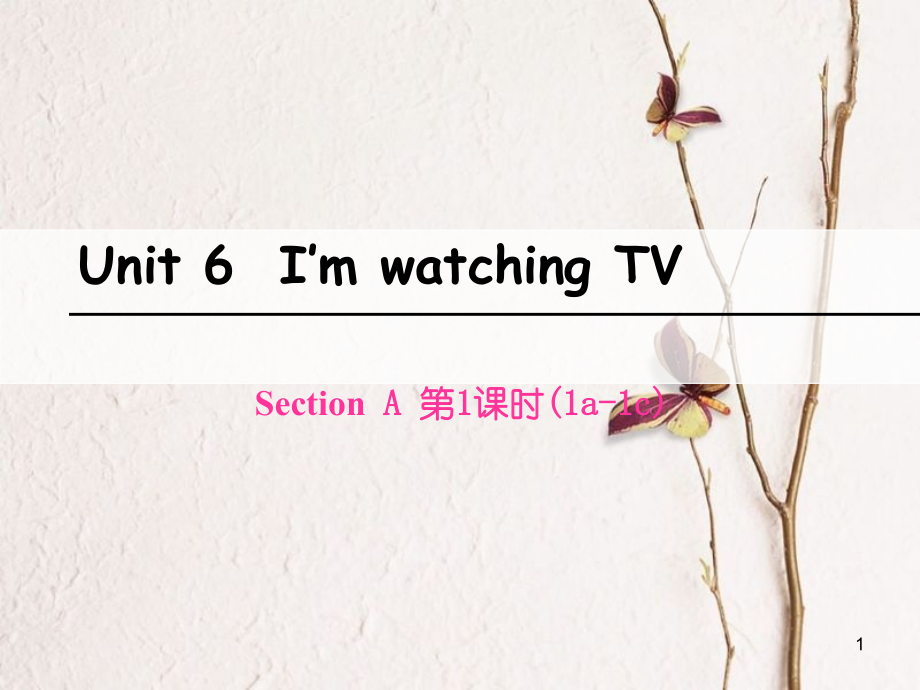《七年級(jí)英語下冊(cè) Unit 6 I’m watching TV(第1課時(shí))Section A(1a-1c)課件 (新版)人教新目標(biāo)版》由會(huì)員分享�����,可在線閱讀���,更多相關(guān)《七年級(jí)英語下冊(cè) Unit 6 I’m watching TV(第1課時(shí))Section A(1a-1c)課件 (新版)人教新目標(biāo)版(18頁珍藏版)》請(qǐng)?jiān)谘b配圖網(wǎng)上搜索。
1�����、Unit 6 Im watching TV Section A A 第第1 1課時(shí)課時(shí)(1a-1c)(1a-1c)1What is she doing?Im watching TV.2She is reading the newspaper.She is using the computer.3What are they doing?They are making soup.They are washing the dishes.4Match the activities with the pictures.1a1.watching TV _2.cleaning _3.reading a ne
2���、wspaper _4.talking on the phone _5.listening to a CD _6.using the computer _7.making soup _8.washing the dishes _9.exercising _idgahebcf5Listen.What are these people doing?Write the numbers from 1a.1ba.Jenny _b.John _c.Dave and Mary _1856Ask and answer questions about what people are doing in 1a.1cW
3��、hat is he doing?Hes using theComputer.7What are they doing?They are washing the dishes.81.現(xiàn)在分詞的構(gòu)成現(xiàn)在分詞的構(gòu)成(1)一般直接在動(dòng)詞后面加一般直接在動(dòng)詞后面加-ing�。如:如:read-reading watch-watching,talk-talking(2)以字母以字母e結(jié)尾的單詞且結(jié)尾的單詞且e不發(fā)音的����,去掉不發(fā)音的,去掉e再加再加-ing����。Language points9如:如:write-writing come coming(3)一個(gè)元音字母加一個(gè)輔音字母且末尾只一個(gè)元音字母加一個(gè)輔音字
4��、母且末尾只有一個(gè)輔音字母的重讀閉音節(jié)詞要雙寫這個(gè)有一個(gè)輔音字母的重讀閉音節(jié)詞要雙寫這個(gè)輔音字母再加輔音字母再加-ing�。如:如:swim swimming run runningbegin-beginningLanguage points102.現(xiàn)在進(jìn)行時(shí)態(tài)現(xiàn)在進(jìn)行時(shí)態(tài)(1)What are you doing?這是現(xiàn)在進(jìn)行時(shí)態(tài)的肯定句形式�。常用來這是現(xiàn)在進(jìn)行時(shí)態(tài)的肯定句形式。常用來詢問對(duì)方正在做什么�,詢問對(duì)方正在做什么,其結(jié)構(gòu)為:主語其結(jié)構(gòu)為:主語+be+v-ing+其他�。回答時(shí)用其他���?���;卮饡r(shí)用“Im+v-ing”�����。如:如:What are you doing now?你現(xiàn)在在做什么����?你現(xiàn)在
5、在做什么�����?Im reading a book.我正在看書。我正在看書�。Language points11 (2)詢問第三人稱在做什么,只需將詢問第三人稱在做什么�����,只需將主語和主語和be動(dòng)詞作相應(yīng)的替換即可���。動(dòng)詞作相應(yīng)的替換即可。如:如:-What is she doing?她在做什么���?她在做什么�?-She is writing a letter.她在寫信她在寫信Language points12(3)進(jìn)行時(shí)的否定結(jié)構(gòu)是進(jìn)行時(shí)的否定結(jié)構(gòu)是:“主語主語+be(not)+動(dòng)詞動(dòng)詞-ing+其他其他”�。表示正表示正在發(fā)生或進(jìn)行的某動(dòng)作。在發(fā)生或進(jìn)行的某動(dòng)作�。如:如:They are not playi
6、ng basketball.他們沒有打籃球�。他們沒有打籃球。Language points13選擇填空選擇填空()1.Look!They music.A.Listen B.listened C.are listening D.are listening to()2.Judy and her sister in the pool.A.Is swimming B.are swimmingC.swim D.are swimming()3.-Where is Mike?-Maybe he TV in the living room.watched B.will watch C.is watching
7�、D.watchDBC小結(jié)訓(xùn)練小結(jié)訓(xùn)練14單詞填空單詞填空1.That _(聽起來聽起來)good.2.He is _(看看)newspapers.3.Tom and his father _ (swim)now.4.Look!They _(run)along the road.5.Listen!The children _(sing)now.6.The boy _(put)on his uniform now.7.Is Tom w_ TV?No,he is reading a newspaper.soundsreading are swimmingare runningare singingi
8、s puttingatching小結(jié)訓(xùn)練小結(jié)訓(xùn)練15句型轉(zhuǎn)換�。句型轉(zhuǎn)換。1.They are flying kites over there.(對(duì)畫線提問對(duì)畫線提問)_ _ they _ over there?2.Im doing my homework.(改為一般疑問句改為一般疑問句)_ _ _your homework?3.Ann plays the piano in the room.(用用now 改寫改寫)Ann _ _ the piano in the room now.4.She is reading newspaper.(改為否定句改為否定句)She newspaper.What aredoing Are you doing is playingis not reading小結(jié)訓(xùn)練小結(jié)訓(xùn)練16完成當(dāng)堂測(cè)評(píng)作業(yè)完成當(dāng)堂測(cè)評(píng)作業(yè)17一般青年的任務(wù)�����,尤其是共產(chǎn)主義一般青年的任務(wù),尤其是共產(chǎn)主義青年團(tuán)及其他一切組織的任務(wù)��,可以用青年團(tuán)及其他一切組織的任務(wù)��,可以用一句話來表示��,就是要學(xué)習(xí)����。一句話來表示,就是要學(xué)習(xí)�����。列寧列寧18
 七年級(jí)英語下冊(cè) Unit 6 I’m watching TV(第1課時(shí))Section A(1a-1c)課件 (新版)人教新目標(biāo)版
七年級(jí)英語下冊(cè) Unit 6 I’m watching TV(第1課時(shí))Section A(1a-1c)課件 (新版)人教新目標(biāo)版

